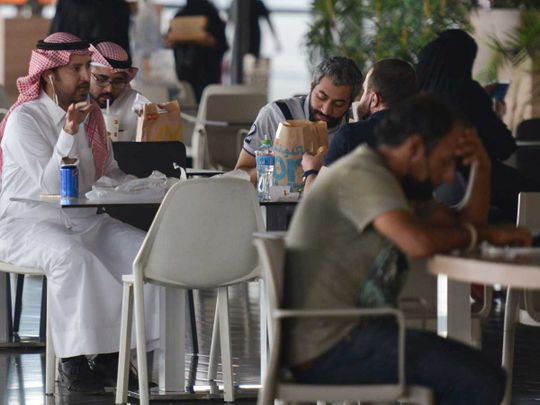
Saudis are gradually coming to terms with a new way of life with the coronavirus that is yet to be contained or defeated. Such a situation is very common to most other countries that have been gradually loosening the restrictions placed during the height of the pandemic, and while we are not unique in experiencing the aftermath of a lockdown, we do have a new realisation on the dangers of the virus.
Perhaps the most significant one has been the postponement of the Haj, an annual pilgrimage of more than two million pilgrims from more than 180 countries. This year there will be no Haj for them, as the kingdom has decided to limit the pilgrimage to no more than 1,000 individuals and those too selected from the residents of the country. With so many people in close quarters with one another and from various parts of the world, the resulting surge of the virus could only be imagined.
Another victim of the virus has been the tight congregation in mosques for prayers. With strict rules in place and social distancing being enforced, many mosques give an eerie feeling of being empty. Many Saudis I have spoken to have also decided to forego visits to their local mosques and pray at home during these uncertain times. The risks are too great in their opinion and until a proven miracle drug is discovered that can cure the COVID-19 virus safely and quickly, they are better off at home.
Schooling during the pandemic
When the lockdown began sometime in late February early March of this year, schoolchildren suddenly found themselves staying put at home all days of the week. Some schools reacted and went into an online teaching format to enable their students to keep up with the curriculum, while others simply winded down the school year with a lot of the work undone. The lack of social interaction of kids with their friends was obvious in their frustration and learning was not perhaps taken as seriously as when physically in attendance at schools.
Some parents whose kids’ schools had simply wound down began exploring online options to continue their children’s education with a shortfall. A by-product of this was the realisation by many parents that present-day school fees were simply outrageous for the quality of education provided. Fees in recent years had simply risen beyond expectations, and with the corona hitting the economy hard, many parents were less inclined to shell out exorbitant school fees when they could find a much cheaper alternative through the net.
Some mothers banded together to form virtual homeschooling groups with specific programmes to keep their children abreast of their studies. It will take a lot of convincing by schools in the future to convince parents to part with their hard-earned money when other options are available and have proven to work in these last few months.
New lifestyle
Another way of life for Saudis that had taken a hit was eating out. With a young population forming the majority of earners, Saudis in general liked nothing better than going out and socialising over a meal at a restaurant. This practice ate a lot of their income, but they were willing to accept some financial strains on their budget in order to socialise. Covid-19 and the subsequent lockdown put a complete stop to all of that. There was no more fraternalising or going out.
Young families began to sense the impact of their abstinence from this luxury as they had money left over at the end of the month, and their credit cards were not being unusually extended. The lockdown also gave an opportunity to a lot of couples to try different menus at home, and to their delight, they found joy and bonding in the experience. With the lockdown lifted, many have learnt their lesson and are staying away from eating out as frequently.
Business trips and expensive flights and hotel accommodations have all but disappeared as international institutions like the UN, OIC, and even the G20 group conducted business through virtual meetings. Countries negotiated delicate diplomatic concerns without the need of sending an expensive delegation of officials and their staff to foreign lands. Will governments and companies be so quick to finance business trips in the future when much can be achieved through a virtual setting? Only time will tell.
Yes indeed, the coronavirus has impacted many institutions of Saudi society, and perhaps some for a very, very long time.
— Tariq A. Al Maeena is a Saudi socio-political commentator. He lives in Jeddah, Saudi Arabia. Twitter: @talmaeena







